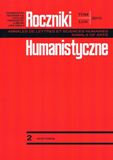Czy polski historyk przełomu XIX i XX wieku mógł być pozytywistą? O przypadku Władysława Smoleńskiego
Could a Polish Historian of the Turn of the 19th and 20th Centuries be a Positivist? On the Case of Władysław Smoleński
Author(s): Iwona KościeszaSubject(s): History
Published by: Towarzystwo Naukowe KUL & Katolicki Uniwersytet Lubelski Jana Pawła II
Keywords: Polish positivism; Warsaw historical school; Władysław Smoleński; sublimity; Polish historiography at the turn of the 19th and 20th centuries; pozytywizm polski; warszawska szkoła historyczna; wzniosłość; historiografia polska przełomu XIX/XX wieku
Summary/Abstract: Władysław Smolen´ ski was one of the leading representatives of the Warsaw historical school. When one talks about the positivist Warsaw school, he usually means its affiliation with the current of Warsaw positivism, and not its relation to the philosophy of positivism, as Polish positivism was a trend with a much more ideological, and not philosophical basis. Still, academics tried to practically implement the postulates of the positivist methodology. For the intelligentsia of that time a critical attitude towards the Catholic Church was typical. The Church’s significance in the history of Poland as well as the role of religion in the reality of those times were criticized. Writing his works on the Enlightenment he became part of the criticism directed towards the Catholic world view, but despite the clear anticlericalism, under the influence of his attitude towards Russia he was able to defend the Church. His brochure, in which he drew the reader’s attention to the tragic fate of the Uniates, is a proof of this. The category of sublimity is useful in interpreting the historiography of that period, as it allows indicating the constant tension between the views of the past declared by the historians on the one hand, and what is hidden in various layers of their narrative on the other.
Journal: Roczniki Humanistyczne
- Issue Year: 58/2010
- Issue No: 02
- Page Range: 225-244
- Page Count: 20
- Language: Polish

